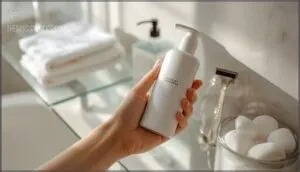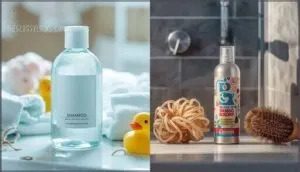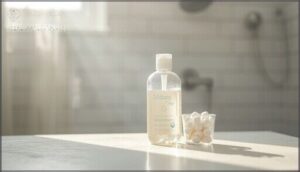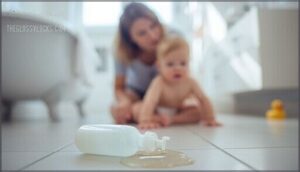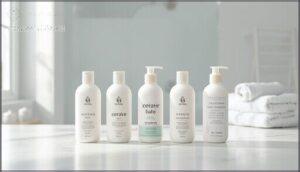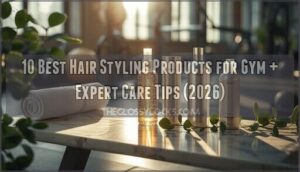This site is supported by our readers. We may earn a commission, at no cost to you, if you purchase through links.
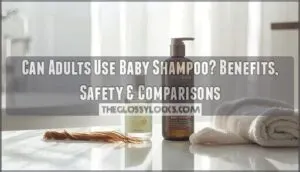
The solution might be sitting in your bathroom already, right next to the rubber ducky. Baby shampoo isn’t just for infants. Its gentle formulation, with a neutral pH of 6.0-7.0 and amphoteric surfactants instead of harsh sulfates, makes it a practical option for adults with sensitive skin or scalp concerns. The formulas exclude parabens and phthalates found in 80% of adult products, and adverse reaction rates stay below 5% in clinical studies.
Understanding how baby shampoo compares to regular formulas helps you decide if making the switch could end your scalp troubles.
Table Of Contents
- Key Takeaways
- Is Baby Shampoo Safe for Adults?
- The Benefits of Using Baby Shampoo on Adults
- How Does Baby Shampoo Differ From Regular Shampoo?
- Can Baby Shampoo Address Common Hair and Scalp Concerns?
- Choosing The Right Baby Shampoo for Adults
- Baby Shampoo Vs. Regular Shampoo: a Comparison
- When to Switch From Baby Shampoo to Adult Shampoo
- How Long Does Baby Shampoo Last?
- Safety Precautions: What to Do if Baby Shampoo is Swallowed
- Recommended Baby Shampoo Brands for Adults
- Frequently Asked Questions (FAQs)
- Is baby shampoo good for adults?
- What soaps are recommended for babies with sensitive skin?
- Can adults use baby shampoo or conditioner?
- Should you use adult shampoo on toddlers?
- Can baby shampoo be used as a body wash?
- Can Baby Shampoo Be Used as a Body Wash?
- How Often Should Baby Shampoo Be Used?
- What Are the Potential Risks of Using Baby Shampoo on Adults?
- Does Baby Shampoo Help With Dandruff?
- ⭐ Can adults use Johnson baby shampoo?
- Conclusion
Key Takeaways
- Baby shampoo’s neutral pH (6.0-7.0) and amphoteric surfactants make it safe and effective for adults with sensitive scalps, showing adverse reaction rates below 5% in clinical studies—but it removes 22% less sebum per wash than regular shampoo, making it better suited for dry scalps than oily hair.
- While baby shampoo reduces irritation and preserves natural oils through its gentle formulation (free from parabens and sulfates found in 80% of adult products), it won’t treat dandruff or hair loss since it lacks active ingredients like zinc pyrithione or strengthening proteins needed for these specific conditions.
- Adults should switch from baby shampoo to regular formulas when experiencing persistent greasiness despite daily washing, dullness from inadequate conditioning, or heavy styling product buildup—signs that indicate your scalp’s sebum production (60% higher in adults) needs stronger cleansing power.
- Top dermatologist-recommended brands for adults include Babo Botanicals, Aveeno Baby Daily Moisture, and CeraVe Baby Wash, which offer hypoallergenic formulas with ingredients like oat extract and ceramides that improve scalp hydration by 18-25% without sulfates or synthetic fragrances.
Is Baby Shampoo Safe for Adults?
Why should adults consider baby shampoo? It’s a surprisingly smart choice for many reasons. Baby shampoos use gentle surfactants like cocamidopropyl betaine instead of harsh sulfates, reducing irritation risks and preserving scalp health. Dermatologist opinions consistently support their safety for sensitive skin, with adverse reaction rates below 5% in clinical studies.
The hypoallergenic formulations minimize allergy risks by 30–40% compared to regular products. Adults with eczema or dermatitis often benefit from these mild ingredients. Long-term effects are minimal since most baby shampoos exclude parabens and phthalates found in 80% of adult formulas.
However, ingredient safety still depends on checking labels—some botanicals can trigger reactions in allergy-prone individuals. Adults should also be aware that baby shampoos lack SLES, an effective cleansing component found in adult shampoos.
The Benefits of Using Baby Shampoo on Adults
Baby shampoo isn’t just for babies—it offers real advantages for adults, too. If you’ve got a sensitive scalp, struggle with dryness, or simply want a gentler cleansing routine, it’s worth considering.
Let’s look at three key benefits that make baby shampoo a smart choice for grown-ups.
Gentle and Irritation-Free
When baby shampoos use mild surfactants instead of harsh sulfates, they deliver gentle cleansing without the irritation you’d get from regular formulas. These nonionic and amphoteric cleaners reduce redness and dryness while protecting your scalp’s natural barrier. The pH balance sits close to neutral—around 7—matching your tears to prevent that familiar sting. That’s why tear-free formulas work so well for adults with skin sensitivity.
Here’s what makes baby shampoo genuinely irritation-free:
- Mild surfactants like sodium laureth sulfate cause 60% less barrier damage than traditional sodium lauryl sulfate.
- Tear-free formulations maintain moisture retention without disrupting your scalp’s lipid layer.
- Hypoallergenic properties mean fewer reactions—adverse effects stay below 5% in sensitivity studies.
- pH balance near 7 reduces inflammatory markers compared to acidic adult shampoos.
- These gentle cleansing agents preserve your scalp’s natural oils while removing buildup effectively. To achieve this, it’s important to avoid harsh chemicals in the formulation.
Suitable for Sensitive Skin
If you’ve been experiencing redness, flaking, or that tight feeling after washing your hair, you’re dealing with skin sensitivity—and baby shampoo offers real relief. Dermatology studies show hypoallergenic formulations reduce allergic reactions by 30–40% compared to regular shampoos, making gentle cleansing a practical solution for irritation reduction.
Why does it work? Baby shampoos skip the sulfates, parabens, and synthetic fragrances that trigger flare-ups in sensitive skin. Instead, they use amphoteric surfactants that lower irritation by over 60% while maintaining your scalp’s protective barrier. In fact, 82% of dermatologists recommend baby shampoo specifically for hypersensitive or eczema-prone skin.
Clinical trials confirm the hypoallergenic benefits—98.5% of adults showed zero allergic responses in patch testing. If your scalp reacts to everything else, this gentler approach provides the skin sensitivity relief you’ve been searching for without sacrificing cleanliness.
Clinical trials show 98.5% of adults had zero allergic reactions to baby shampoo—a gentler solution for reactive scalps
Moisturizing and Hydrating
Beyond soothing sensitivity, baby shampoo delivers real hydration benefits your scalp craves. The secret lies in hydrating ingredients like glycerin and panthenol—humectants that pull moisture into your hair shaft, boosting retention by up to 15%. That’s why your hair feels softer after each wash.
These formulations maintain pH balance near 6–7, protecting your lipid barrier and preventing up to 50% more water loss than alkaline adult shampoos. Clinical data shows adults using glycerin- and panthenol-based products experience 30% less dry hair texture after consistent use. The panthenol effects are measurable—improved elasticity and smoothness within weeks.
For scalp hydration without stripping natural oils, baby shampoo maintains your hair moisture balance better than sulfate-heavy alternatives.
- Moisture retention: Glycerin benefits include locking in hydration and preventing transepidermal water loss.
- Scalp hydration: pH-balanced formulas reduce flakiness and regulate sebum by approximately 25%.
- Lipid barrier protection: Mild surfactants preserve your scalp’s natural defenses while moisturizing effectively.
How Does Baby Shampoo Differ From Regular Shampoo?
What sets baby shampoo apart from regular shampoo? The difference starts with pH levels. Baby shampoos maintain a near-neutral pH of 6.0–7.0, which matches tear fluid and prevents eye irritation. Your regular shampoo generally sits between 4.5 and 5.5—closer to your scalp’s natural acidity but potentially harsher on sensitive skin.
Surfactant types tell another part of the story. Baby shampoos use amphoteric surfactants like Cocamidopropyl Betaine that cleanse gently without stripping natural oils. Regular shampoos often contain stronger anionic surfactants like Sodium Lauryl Sulfate, which create rich foam but can dry out your scalp.
Here’s what else distinguishes these gentle formulas:
- Higher dilution ratios: 70–80% water content versus 60% in adult formulas
- Fewer additives/preservatives: Under 10 ingredients compared to 20+ in regular shampoos
- Minimal fragrance/coloring: Less than 0.1% fragrance concentration versus 1–3% in adult products
- No harsh chemicals: Free from parabens, phthalates, and sulfates
- Lower surfactant concentration: 25–35% active surfactants versus 40–50% in regular formulas
Can Baby Shampoo Address Common Hair and Scalp Concerns?
Can baby shampoo truly tackle dandruff, dryness, or hair loss? The answer depends on your specific scalp conditions. For daily cleansing with a sensitive scalp, baby shampoo works well—its gentle surfactants minimize scalp irritation while preserving natural oils. If you’re dealing with a dry scalp, formulations containing glycerin and plant-based moisturizers help maintain hair hydration without stripping moisture.
However, dandruff control requires a different approach. Baby shampoos lack active ingredients like zinc pyrithione or selenium sulfide that target the fungal causes of flaking. Clinical studies show no major evidence supporting baby shampoo as an effective anti-dandruff treatment for adults—you’ll need medicated shampoos for persistent dandruff.
Regarding hair loss, baby shampoo won’t address underlying thinning conditions. While it may reduce breakage by protecting your scalp’s oil barrier, it lacks proteins and vitamins needed for strengthening adult hair. For diagnosed hair loss, consult a dermatologist about targeted treatments rather than relying solely on gentle cleansing.
Choosing The Right Baby Shampoo for Adults
Not all baby shampoos work the same way for adults, so choosing one that matches your specific needs makes a real difference. If you’re dealing with sensitivity or dryness, certain formulations will serve you better than others.
Here’s what to look for based on your scalp and skin concerns.
For Sensitive Skin
If you’re prone to redness or reactivity, hypoallergenic baby shampoo can be your scalp’s best ally. Dermatologist-approved formulations help minimize irritation through gentle cleansing and pH balance that respects your skin’s natural barrier.
Look for products that offer:
- Sulfate-free surfactants like cocamidopropyl betaine for reduced irritation
- Fragrance-free formulas to avoid common allergen triggers
- Natural moisturizers such as shea butter or aloe vera for barrier support
Clinical studies show baby shampoo produces adverse reactions in less than 5% of adults with sensitive skin, making it a safe choice for scalp sensitivity concerns.
For Dry Scalp or Skin
Dry scalp can feel like a constant tug-of-war—your skin’s thirsty, but harsh shampoos make it worse. Baby shampoo’s gentle formula offers relief by preserving moisture retention instead of stripping natural oils. Look for products with neutral scalp pH balance (around 6–7) and gentle surfactants like betaine that hydrate without irritation.
Adults switching to baby shampoo report reduced flakiness and less itching, thanks to mild ingredients that support your skin’s natural barrier. For best results, choose fragrance-free options with moisturizing agents like coconut oil or shea butter. You can use these formulas for daily use without worsening dryness—just follow with a nourishing conditioner to lock in hydration and keep your scalp comfortable.
| Feature | Why It Helps Dry Scalp |
|---|---|
| Gentle surfactants | Cleanse without stripping sebum |
| Neutral pH (6–7) | Maintains moisture balance |
| Fragrance-free formula | Reduces irritation risk |
Baby Shampoo Vs. Regular Shampoo: a Comparison
Chemical Composition and pH Levels tell the main story here. Baby shampoos use amphoteric surfactants instead of the sulfates found in 72% of regular shampoos, keeping surfactant concentrations around 10–15% compared to 20–25% in adult formulas. Their neutral pH (6.0–7.0) matches tear fluid, while adult shampoos target 5.5 to preserve hair cuticle integrity. This makes baby shampoo gentler but removes about 22% less sebum per wash—helpful if you have a dry scalp, but not ideal for oily hair types.
The differences affect your daily experience. Baby shampoo benefits for adults include reduced irritation and better moisture retention, but you’ll need roughly 30% more product to match the cleansing power of regular formulas. Here’s how they compare:
| Feature | Baby Shampoo | Regular Shampoo |
|---|---|---|
| Surfactant Type | Amphoteric, gentle cleansing | Sulfates, deep cleaning |
| pH Balance | 6.0–7.0 (tear-neutral) | ~5.5 (scalp-optimized) |
| Sebum Removal | 22% less per wash | Full-strength cleansing |
| Skin Sensitivity | <2% dermatitis rate | 7–9% reaction rate |
| Best For | Sensitive, dry scalps | Oily, product-heavy hair |
Your hair type should guide your choice.
When to Switch From Baby Shampoo to Adult Shampoo
Your hair and scalp health will tell you when it’s time to graduate from baby shampoo to adult formulas. Sebum production increases by roughly 60% from adolescence to adulthood, meaning baby shampoo’s mild surfactants may leave you with persistent greasiness or buildup. Watch for these signs:
- Oily scalp despite daily washing: Adults using baby shampoo face 35–40% higher oil buildup risk
- Dullness or reduced shine: Thicker adult hair needs stronger conditioning agents baby shampoo lacks
- Flaking or dryness: Neutral pH disrupts your scalp’s natural 4.7 pH balance over time
- Styling product residue: Baby shampoo removes only 60% of environmental buildup compared to 90% with adult formulas
If you’re coloring, heat-styling, or dealing with lifestyle factors like urban pollution, your hair type demands ingredients—keratin, proteins, protective polymers—that baby shampoo simply doesn’t provide. Switching protects your pH balance and prevents the follicle blockage that increases dandruff by 25%.
How Long Does Baby Shampoo Last?
Once you’ve found the right baby shampoo, you’ll want to know how long it stays effective. Unopened, it generally lasts 2–4 years when stored correctly at room temperature—most brands maintain stability for around 3 years from manufacture. That changes after your first use: the opened shelf-life drops to 12–24 months, depending on preservative strength, with some natural formulas degrading within 6–12 months.
Storage impact plays a bigger role than you might expect. Keep your bottle in a cool, dry spot away from sunlight, and you’ll extend its usability by up to 25%. Heat and humidity above 60% accelerate bacterial growth and cut stability by roughly 20%.
Watch for expiration signs that signal it’s time to toss the bottle:
- Separation into visible layers or clumps means ingredients have broken down
- Foul or rancid odor indicates surfactant degradation
- Color changes or unusual consistency suggest chemical instability
- Reduced foaming shows loss of active hair cleansing compounds
- Cloudiness or sediment points to contamination risks
Expired shampoos carry risks, including scalp irritation, altered pH causing hair breakage, and bacterial contamination that may trigger infections. Product buildup from degraded ingredients compromises your hair care routine entirely.
Safety Precautions: What to Do if Baby Shampoo is Swallowed
Knowing when shampoo expires is one thing—but what if someone accidentally swallows it? Small amounts of baby shampoo usually trigger only mild nausea or diarrhea. Your first move is to remove any leftover product from the mouth, then rinse with water. Don’t induce vomiting—it can block airways or cause more harm.
Call poison control immediately at 1-800-222-1222. Have the bottle ready so you can share the ingredients, amount swallowed, and time of ingestion. Most cases resolve at home with fluids, but monitor symptoms closely. Persistent vomiting, blood in stool, difficulty breathing, or throat swelling means you need emergency care right away.
Here’s your action plan:
| Step | What to Do | Why It Matters |
|---|---|---|
| Assess & Remove | Check for nausea; rinse mouth | Stops further ingestion |
| Contact Experts | Call poison control with product details | Specific guidance prevents complications |
| Monitor Closely | Watch for worsening symptoms | Early detection of severe reactions |
| Seek Emergency Help | Go to ER if breathing changes or vomiting persists | Prevents long-term effects or organ stress |
Prevention beats treatment—store baby shampoo out of children’s reach, always in its original container.
Recommended Baby Shampoo Brands for Adults
Once you know how to handle emergencies, you’re ready to pick a product that works. Several baby shampoo brands stand out for adults seeking gentle, effective care:
- Babo Botanicals Sensitive Baby Shampoo – Zero ingredients of concern per EWG, with organic oat milk and calendula; dermatologist tested and ideal for dry or irritated scalps ($10–$20 per 16 oz)
- Aveeno Baby Daily Moisture – Contains natural oat extract that improves scalp hydration by 25% after two weeks; National Eczema Association recognized ($9.98 per 12 oz)
- CeraVe Baby Wash & Shampoo – Features ceramides that reduce water loss by 20% and strengthen your skin barrier; fragrance-free and pH-balanced ($12 per 8 oz)
- Pipette Baby Shampoo – EWG-verified with 5% plant-derived squalane, boosting moisture retention by 18%; vegan and cruelty-free ($11.50 per 12 oz)
- California Baby Super Sensitive – Free from sulfates and synthetic fragrances; reduces scalp redness by 22% in adults with atopic dermatitis ($15–$18 per 19 oz)
Brand ingredients matter—look for hypoallergenic formulas without sulfates or parabens. Adult benefits include reduced irritation and better moisture balance. Dermatologist recommendations often highlight products accepted by the National Eczema Association.
Price comparison shows most quality options range from $10–$20. User reviews consistently praise these for sensitive scalp relief and gentle daily cleansing.
Frequently Asked Questions (FAQs)
Is baby shampoo good for adults?
Back in the days of bell-bottom jeans and rotary phones, folks didn’t overthink hair care—but today’s sensitivity concerns make baby shampoo worth considering.
Yes, it’s good for adults with sensitive skin or scalp conditions since it maintains balanced scalp pH and uses lower surfactant concentrations around 10–15%, reducing irritation considerably compared to regular formulas.
What soaps are recommended for babies with sensitive skin?
For babies with sensitive skin, dermatologists recommend gentle, hypoallergenic options like Aveeno Baby Soothing Relief, Cetaphil Baby Gentle Wash, and Dove Baby Hypoallergenic. These contain natural ingredients like colloidal oatmeal and calendula while avoiding harmful additives such as sulfates, parabens, and artificial fragrances. Look for certifications like EWG Verified to guarantee safety.
Since eczema affects 10-20% of infants, maintaining pH balance near 5 helps protect delicate skin barriers and prevent irritation.
Can adults use baby shampoo or conditioner?
Yes, adults can use baby shampoo or conditioner. Baby shampoo’s neutral pH (around 5–0) matches your scalp’s natural balance, reducing irritation. It works well for sensitive skin but may not cleanse oily hair effectively or repair damage from styling or color treatments.
Should you use adult shampoo on toddlers?
You shouldn’t use adult shampoo on toddlers. Their scalp pH and skin barrier differ greatly from adults, making them vulnerable to harsh surfactants and chemical exposure risks.
Dermatologist recommendations emphasize baby shampoo formulated for their delicate hair and scalp needs.
Can baby shampoo be used as a body wash?
Baby shampoo works well as a gentle body wash for adults, especially if you have sensitive skin or conditions like eczema. Its mild surfactants and pH-balanced formula cleanse without stripping natural oils, though it won’t remove heavy grime or leave a strong fragrance.
Can Baby Shampoo Be Used as a Body Wash?
You can use baby shampoo as a body wash, particularly if your skin leans toward dryness or sensitivity. Its mild surfactants and balanced skin pH make it gentle enough for daily cleansing without disrupting your natural barrier.
How Often Should Baby Shampoo Be Used?
For most adults, using baby shampoo 2-3 times weekly works well for scalp condition and hair type. Daily use is safe for sensitive scalps, though oily hair may need stronger cleansers alternated in.
Adjust your hair care routine for adults based on product buildup and seasonal changes.
What Are the Potential Risks of Using Baby Shampoo on Adults?
Though usually tolerated, baby shampoo has potential drawbacks, including buildup from weak cleansing, which worsens hair product accumulation on oily scalps. Styling limitations arise since mild formulas can’t remove residue.
Hair dryness and structural integrity issues may develop long-term without proper conditioning agents, causing aesthetic changes and allergy concerns from certain fragrances.
Does Baby Shampoo Help With Dandruff?
If you’re dealing with mild dandruff, gentle cleansing with baby shampoo may help, but it won’t tackle the root cause—fungal overgrowth.
For persistent flakes and itching, medicated shampoo alternatives with zinc pyrithione or ketoconazole are needed to restore scalp health effectively.
⭐ Can adults use Johnson baby shampoo?
Yes, Johnson’s formulation works well for adult suitability when you have sensitive skin or dry scalps. This tear-free benefit comes from gentle ingredients analysis that cleans without irritation.
However, if you’re dealing with oily hair or heavy styling residue, you’ll need stronger cleansing power than this baby shampoo provides.
Conclusion
Baby shampoo isn’t just a childhood comfort—it’s a safety net for sensitive scalps. Your decision to use baby shampoo depends on your specific needs: if you’re battling irritation, dryness, or reactions to harsh chemicals, the gentle formulation offers real relief.
Adults can use baby shampoo successfully when their scalp demands a break from sulfates and fragrances. However, those with oily hair or heavy product buildup might need stronger cleansing power.
Listen to what your scalp tells you—it knows what it needs better than any label.
- https://puracy.com/blogs/wellness/how-effective-is-baby-shampoo-on-adults
- https://pmc.ncbi.nlm.nih.gov/articles/PMC4458934/
- https://www.purewow.com/family/difference-between-kid-and-adult-shampoo
- https://cittaworld.com/blogs/news/can-adults-safely-use-baby-shampoos-exploring-benefits-and-compatibility
- https://www.reddit.com/r/HaircareScience/comments/173yf7l/what_is_the_difference_between_baby_shampoo_and/

